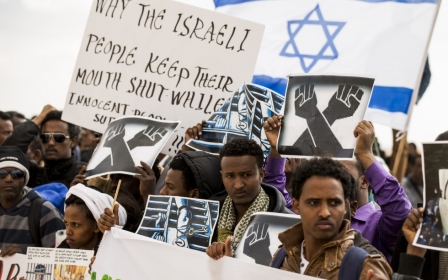Is Israel’s Supreme Court living on borrowed time?

There is an old joke concerning the difference between an Englishman and an Israeli: the Englishman leaves without saying goodbye; the Israeli says goodbye, but doesn’t leave. Interior minister and Netanyahu’s heir-apparent, Gideon Sa’ar, seemed determined to prove the adage this week, as he launched into a forceful campaign to forestall the closing of the Holot detention facility for asylum seekers - despite announcing last month, with much fanfare and to everyone’s surprise, that he was quitting his office, the parliament and politics in general.
This dawdling at the door is hardly surprising, considering how many low-hanging fruit presented themselves to Sa’ar by the Supreme Court ordering the camp to be shut down – striking down the legislation that supports it for an unprecedented second time.
Point-scoring
For Sa’ar, already halfway out the door, there are suddenly cheap points to be scored by harping on Israeli xenophobia; “security” scores to be ramped up at the expense of the refugees - the only way Sa’ar will ever get any security points, in all honesty, since his military background is unimpressive and his purview at the Interior Ministry offers few other aliens to scapegoat; and an opportunity to rally the popular base of native Israeli slum residents frustrated by the influx of penniless refugees into their already impoverished neighbourhoods. Many residents there are long-standing Likud voters seduced in recent years by the fringe right; for Sa’ar, this is a chance to win them back, which will surely not go amiss in any future Likud leadership struggle.
Yet there is an even plumper fruit that has slid down much closer to the ground - the Supreme Court itself, for years now a target for Sa’ar and his fellow conservatives, who see the unelected Justice’s power to strike down legislation it deems unconstitutional as a profoundly illegitimate encroachment on the popular mandate of the legislative authority.
If the court’s double-censure of the same legislation was already unprecedented in its own right, so would be another attempt by the executive and the legislature to defy it and pass the proscribed law for a third time. It would put the court on the spot and will serve as a weather-wane for future attempts to constrict its purview.
But the battle to bar the court from interfering with legislation and with security affairs will take much longer, quite possibly outlasting the current leadership of both parliamentarians and justices. It could be instructive, therefore, to sample the newest generation of the Supreme Court, announced last week but yet to be sworn in, by considering a man who many rush to cast as an unbarring antiestablishment figure - former attorney general Menachem “Meni” Mazuz.
On the face of it, Mazuz’s appointment to the Supreme Court is the stuff of classical legal drama: poor boy from a discriminated community turned fearless, combative attorney-general who launched corruption investigations against the most powerful men in government; combative prosecutor retiring to pasture in the law faculty of Tel Aviv University; popular law professor summoned from the classroom to the bench of the Supreme Court, derided at home and lauded abroad for its judicial activism. But there are good reasons why not all supporters of the Supreme Court are taking heart at the news.
Mazuz, a first-generation Tunisian immigrant, hauled himself out by the proverbial bootstraps out of the dusty nowhere town of Netivot, where many Mizrachi Jewish families were settled. After serving in the IDF as a tank commander, Mazuz entered the faculty of law at the Hebrew University, graduating cum laude and clerking for two Supreme Court Justices and for the Supreme Court department at the State Attorney office for several years. When the inevitable choice between private practice and public office came, Mazuz chose the latter, staying on with the State Attorney and later the Ministry of Justice, rising through the ranks. In 2004, he was appointed attorney general - the one official empowered to decide whether to strip parliamentary immunity from elected officials. No woman or man to have occupied the office has made as prolific a use of that power as Menachem Mazuz.
By the end of his six-year term, Mazuz’s tally of investigations and prosecutions topped that of his three predecessors combined. Three MKs prosecuted and convicted of voting frauds; finance minister Abraham Hirshezon, investigated, charged and convicted of accepting bribes; religious affairs minister Shlomo Benizri, investigated, charged and convicted of the same. Justice minister Chaim Ramon, charged, prosecuted and convicted of sexual assault - forcibly kissing a young IDF officer at a ministry function; Ex prime minister Ehud Olmert, investigated and convicted in one of three charges in another bribery affair (the Rishon Tours case); and last but not remotely least, President Moshe Katsav, pulled down kicking and screaming from his office to be convicted of multiple cases of rape and sexual assault of subordinates, stretching back two decades.
Significantly, Mazuz also chose to close a major corruption probe into the private dealings of former prime minister Ariel Sharon (the Greek Island Affair.) Sharon, whose cronyism was the stuff of legend, never again faced criminal investigation in his life. Katsav, Hirshezon and Benizri are still in prison.
Faith in the law
This fearlessness in wrestling down powerful men who broke the law was accompanied, perhaps not altogether suprisingly, by stringent faith in the law itself, and in the institutions that enshrine it – at the expense of any other civil value. This became obvious early on in his term, when Mazuz made headlines by announcing his sympathy and understanding for conscientious objectors, saying it was an indicator of a caring society – before emphasising that commendable though their beliefs may be, they still break the law and absolutely must be punished.
The stance – an entirely unexpected one for someone in Mazuz’s position – provoked a furious backlash from the centre rightwards, and a flurry of sympathetic headlines from the more liberally inclined journalists. What few of the critics or admirers took note of, however, was the rest of Mazuz’s talk, in which he explicitly adopted the army’s traditional distinction between truly “pacifist” objectors revolted by the very sight of firearms, and “political” ones, revolting against actual policies – be it the occupation or the eviction of settlements.
He went on to observe that morally commendable though conscientious objection may be, it is equally moral and essential for society to make sure the objector “paid a price” for his or her beliefs; and concluded vaguely that while punishment is desirable, it should also be “proportionate” – whatever that meant and whoever the arbiter.
Later on, concluding his tenure in his last interview as attorney general, Mazuz elaborated his views on judicial activism – the most drastic constitutional action the Supreme Court can apply. “You can definitely say I have reservations,” he told the house journal of the Israeli Bar Association in October 2010. “I think the court should be careful not to engage with questions that are not, essentially, legalistic, questions which are meant to be decided on by the other authorities.”
In another man, this deference to “the other authorities” – the cabinet and the Knesset – might be seen as tactful, or tactical. In Mazuz, this sentiment seems to echo his private code: morals are morals but laws are laws, and the latter must inevitably triumph. It’s too soon to tell how this sentiment will play out in the battle for the Supreme Court’s powers in the coming years, but this fervent adherence to the letter of the law may not bode well for an institution meant to preserve its spirit.
New MEE newsletter: Jerusalem Dispatch
Sign up to get the latest insights and analysis on Israel-Palestine, alongside Turkey Unpacked and other MEE newsletters
Middle East Eye delivers independent and unrivalled coverage and analysis of the Middle East, North Africa and beyond. To learn more about republishing this content and the associated fees, please fill out this form. More about MEE can be found here.



